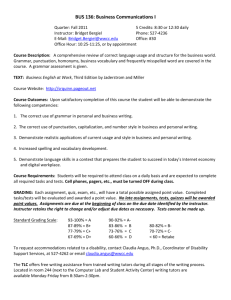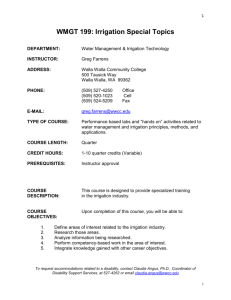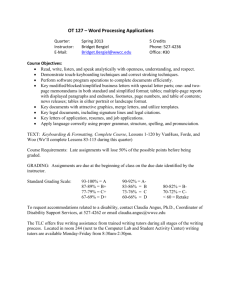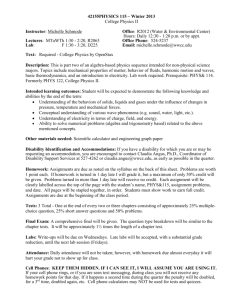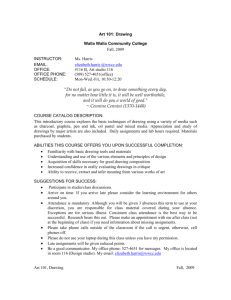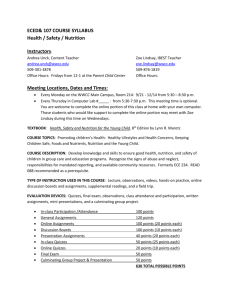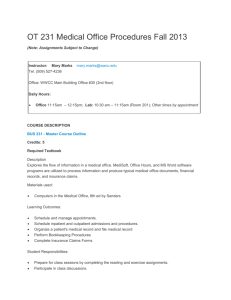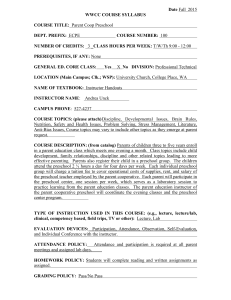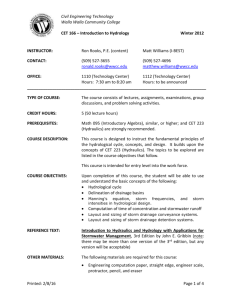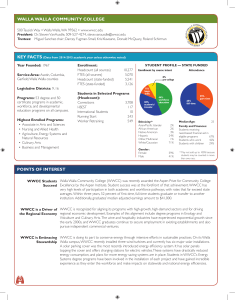View Syllabus - Walla Walla Community College
advertisement
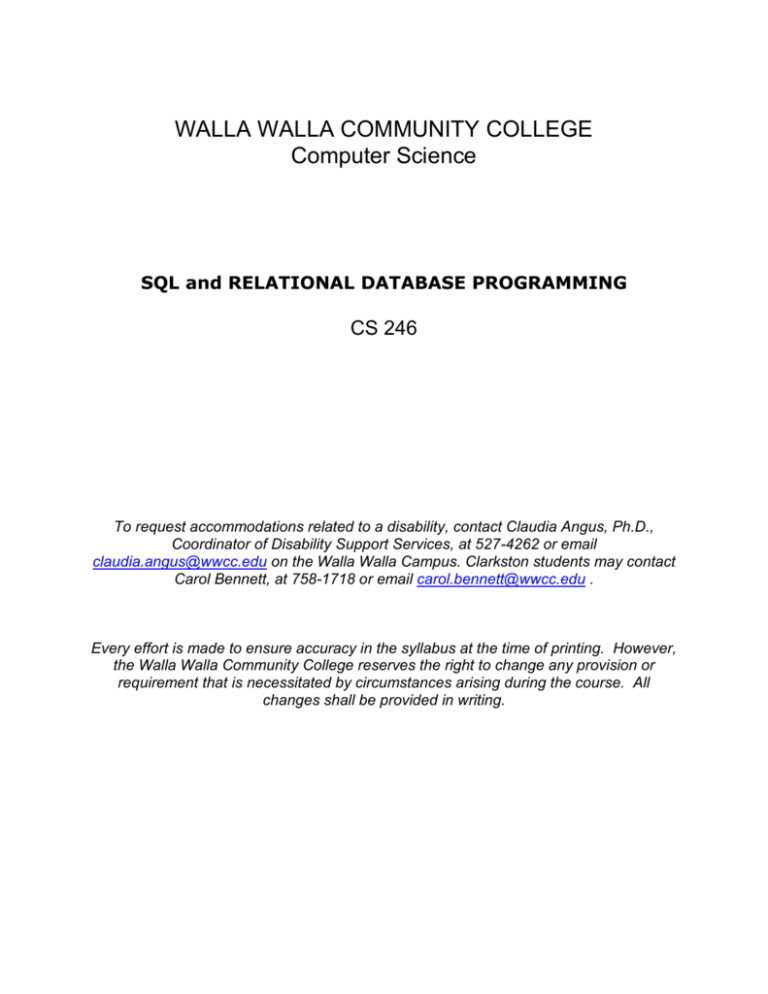
WALLA WALLA COMMUNITY COLLEGE Computer Science SQL and RELATIONAL DATABASE PROGRAMMING CS 246 To request accommodations related to a disability, contact Claudia Angus, Ph.D., Coordinator of Disability Support Services, at 527-4262 or email claudia.angus@wwcc.edu on the Walla Walla Campus. Clarkston students may contact Carol Bennett, at 758-1718 or email carol.bennett@wwcc.edu . Every effort is made to ensure accuracy in the syllabus at the time of printing. However, the Walla Walla Community College reserves the right to change any provision or requirement that is necessitated by circumstances arising during the course. All changes shall be provided in writing. SYLLABUS Course Section Syllabus & Assessment of Student Learning COURSE IDENTIFIER: CS 246 COURSE TITLE: SQL Relational Database Design INSTRUCTOR NAME: Wallace Fisher OFFICE LOCATION: Technical Center Room 1212A OFFICE HOUR Arranged NAME OF TEXTBOOK: PHP Programming with MySQL, Don Gosselin, 2nd Edition, Course Technology, ISBN: 0-538-74584-3 CATALOG DESCRIPTION: Investigate and use SQL and related database programming languages in order to retrieve data in a meaningful way. Students will develop and present a final project. The course will focus on the use of web based data retrieval technology. Students will also research relevant specific topics and debate uses of different data retrieval techniques and computer. CLASS HOURS PER WEEK: 5 TEACHING FORMAT: Lab/Lecture LOCATION: Arranged Office Phone: E-mail: 527 - 4584 wallace.fisher@wwcc.edu STUDENT LEARNING ASSESSMENT STRATEGY: Tests, homework, attendance, observation, and quizzes: Assessment Devices: Grading Policy: Grade Points 4.0 3.7 3.3 3.0 2.7 Grades are based on the percentage of total points earned for tests, projects, homework assignments, and class attendance. The Master Course Outline for this course may be viewed here. Letter Grade A AB+ B B- % Of Total Pts. 94-100 90-93 87-89 84-86 80-83 Grade Points 2.3 2.0 1.7 1.3 1.0 0.0 Letter Grade C+ C CD+ D F % Of Total Pts. 77-79 74-76 70-73 67-69 60-66 0-59 To request accommodations related to a disability, contact Claudia Angus, Ph.D., Coordinator of Disability Support Services, at 527-4262 or email claudia.angus@wwcc.edu COURSE POLICIES Homework Assignments You are expected to read each assigned project prior to the lecture. Lectures will be short, to the point. If you are absent or late, you are responsible for getting the course notes, handouts, and laboratory assignments you missed. All your homework will be supplied from the teacher, and must be done before the due date. Late assignments will be accepted for up to two school days following the due date and will be penalized 25 %. No assignments will be accepted more than two days late. I do not accept emailed assignments. Plan to spend approximately four to six hours each week working on homework and laboratory assignments. Examination Policy We will have weekly quizzes and the dates are listed in the Weekly Assignment and Classroom Schedule. No make-up exams will be allowed without prior arrangements being made with your instructor. If you do have to miss class on the day of the class and have to take a make-up exam understand it will be a different test than what your peers have taken. The make-up exams are usually more difficult due to the fact that you are being allowed more time to prepare. To prepare for examinations, attend lecture and read the chapters and complete all homework. At least 95 % of the problems are taken directly from the reading material or demonstrations presented in class lectures. Student Conduct in Class Policy Any acts of classroom disruption that go beyond the normal rights of students to question and discuss with instructors the educational process relative to subject content will not be tolerated, in accordance with the Academic Code of Conduct described in the Student Handbook. Children in Class Policy Children are not allowed in classroom or laboratory facilities, this is campus wide policy for safety reasons. Electronic Devices in Class Policy Cellular telephones, pagers, CD players, radios, and similar devices are prohibited in the classroom and laboratory facilities. If you are expecting an important cell phone call make sure your phone is on vibrate and you leave the classroom to take the call. Appeals Policy To appeal a grade, send an e-mail to your instructor's e-mail address within two weeks of receiving the grade. Overdue appeals will not be considered. Disabilities Policy In compliance with the Americans with Disabilities Act (ADA), all qualified students enrolled in this course are entitled to “reasonable accommodations.” Please notify the instructor during the first week of class of any accommodations needed for the course. To request accommodations related to a disability, contact Claudia Angus, Ph.D., Coordinator of Disability Support Services, at 527-4262 or email claudia.angus@wwcc.edu Incomplete Policy Students will not be given an incomplete grade in the course without sound reason and documented evidence as described in the Student Handbook. In any case, for a student to receive an incomplete, he or she must be passing and must have completed at more than 50% of the coursework with a passing grade. Lab Monitors Lab monitors in the computer labs are on duty to assist you with hardware and software problems. If your computer malfunctions or your printer is out of paper, go to the main desk and ask a lab monitor for help. The lab monitors are student assistants and may not be able to answer specific homework questions. VIEWING YOUR GRADES 1. I pass grade sheets out every two weeks or so. 2. You will to see your grades either on the K drive students folder or in Angel. 3. You can also ask to see your grade in class or you can come by my office during my office hour. Cheating Policy You are a college student and as such must honor the code of ethics so copying another students homework answers will not be tolerated. I have failed many students for cheating; they always respond I did not know I was cheating. Ignorance is never an acceptable excuse in life or in my classroom. Students are expected to uphold the school’s standard of conduct relating to academic honesty. Students assume full responsibility for the content and integrity of the academic work they submit. The guiding principle of academic integrity shall be that a student's submitted work, examinations, reports, and projects must be that of the student's own work. Students shall be guilty of violating the honor code if they: 1. Represent the work of others as their own work. 2. Use or obtain unauthorized assistance in any academic work. 3. Give unauthorized assistance to other students. 4. Modify, without instructor approval, an examination, paper, record, or report for the purpose of obtaining additional credit. 5. Misrepresent the content of submitted work. The penalty for violating the honor code is severe. Any student violating the honor code is subject to receive a failing grade for the course and will be reported to the Office of Student Affairs. If a student is unclear about whether a particular situation may constitute an honor code violation, the student should meet with the instructor to discuss the situation.
